John Huss Collection (7 vols.)
Digital Logos Edition
Overview
John Huss (also known as Jan Hus or John Hus): Bohemian priest, reformer, and martyr. Influenced by the teachings of Wycliffe and supported by fellow theologians at the University of Prague, Huss was an early advocate of church reform. He preached Wycliffe’s ideas, championing doctrines such as justification by grace through faith alone, full communion for laypeople, and adoption of the liturgy to the common language of the people. A precursor to the Reformation of the sixteenth century, Huss is perhaps best represented in an early Moravian hymnbook picture showing Wycliffe seizing a torch, Huss lighting it, and Luther holding it on high.
The John Huss Collection contains seven volumes dedicated to the life and work of John Huss and the impact he had on Christendom. The Letters of Jon Hus contains 82 annotated letters by Huss, including letters written just before his execution in 1415. The Church is considered his most important work; from its pages the charges were drawn upon which he was pronounced a heretic at the Council of Constance.
This collection also contains Count Lützow’s The Life and Times of Master John Hus, E. H. Gillett’s two-volume The Life and Times of John Huss; or, the Bohemian Reformation of the Fifteenth Century, David S. Schaff’s John Huss: His Life, Teachings, and Death after Five Hundred Years, and more.
The history of Bohemia and the influence of John Huss are vital to understanding the pre-Reformation atmosphere. Find out why Martin Luther stated, “In my opinion John Huss bought with his own blood the gospel which we now possess.” In the Logos edition of the John Huss Collection, all Scripture passages are tagged and appear on mouse-over. For scholarly work or personal Bible study, this makes these texts more powerful and easier to access than ever before. With the advanced search features of Logos Bible Software, you can perform powerful searches by topic or Scripture reference—finding, for example, every mention of “grace” or “Romans 5:1.”

- 82 letters written by John Huss
- David S. Schaff’s translation of The Church, as well as his biography John Huss: His Life, Teachings, and Death after Five Hundred Years
- In-depth comparisons of Huss’ and Wycliffe’s teachings
- Title: John Huss Collection
- Volumes: 7
- Pages: 2,800
- The Letters of Jon Hus with Introductions and Explanatory Notes
- The Church
- John Huss: His Life, Teachings, and Death after Five Hundred Years
- The Life and Times of Master John Hus
- John Huss: The Witness
- The Life and Times of John Huss; or, the Bohemian Reformation of the Fifteenth Century, vol. 1
- The Life and Times of John Huss; or, the Bohemian Reformation of the Fifteenth Century, vol. 2
This title is included in the following collections
You can save when you purchase this product as part of a collection.
Logos 5 Reformed Platinum Lega...
$1,499.99$1,499.99Logos 7 Reformed Diamond Legac...
$2,999.99$2,999.99Logos 5 Reformed Diamond Legac...
$2,999.99$2,999.992025 Reformed Portfolio
$4,749.99$3,562.49
- $4,749.99
- $4,749.99
- $11,399.99
- $11,399.99
- $11,399.99
- $23,999.99$17,999.99
- $21,749.99
- $24,999.99
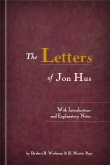
John Huss’ letters have long been recognized as one of the world’s spiritual treasures. This English translation presents a portrait of the Reformer that only letters can give—one painted by the subject himself. The Letters of Jon Hus with Introductions and Explanatory Notes contains 82 annotated letters along with a short introduction on the life and works of Huss. Workman and Pope have organized the letters chronologically in the following six sections:
- Letters Written Before the Death of Archbishop Zbinek
- From the Death of Zbinek to the Exile of Hus
- Letters Written During the Exile of Hus
- Letters Written on the Journey to Constance
- Letters Written During the Imprisonment at the Blackfriars
- Letters Written from the Franciscan Friary
We see the martyr facing death with quiet fortitude. He puts away from him the temptations to escape the stake by the sacrifice of his convictions, and calmly leaves himself in the hands of God. The story here told is one which can never lose its interest, and this volume brings us nearer to the prison and the stake than any other. It is a work for which all lovers of truth will feel a deep debt of gratitude.
—London Quarterly Review
A valuable and most welcome addition to our English literature on the great Bohemian Reformer, by which at last we get an adequate translation of a correspondence of great and varied interest. Both authors have done their part well.
—Critical Review of Theological and Philosophical Literature
The book is a very valuable contribution to Church history.
—The Spectator
Herbert B. Workman (1862–1951) was a Wesleyan minister and the principal of Westminster College. He was elected president of the Wesleyan Conference in 1930. He wrote numerous works on church history, including Persecution in the Early Church, Christian Thought to the Reformation, and The Evolution of the Monastic Ideal.
R. Martin Pope (1862–1951) earned his MA from St. John’s College in Cambridge, and entered the Wesleyan ministry in 1888. His works include On Roman Roads with St. Paul, An Introduction to Early Church History, The Hymns of Prudentius, and Studies in the Language of St. Paul.
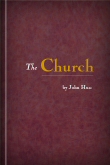
Of the writings of John Huss of Bohemia, The Church is the most important. From its pages, the charges were drawn upon which the author was pronounced a heretic by the Council of Constance and—the same day, July 6, 1415—burned at the stake. Huss found the principles set forth in this treatise in the writings of Wycliffe. The main principles are shared with Wycliffe, and Huss and Wycliffe use many of the same quotations from the Fathers, canon law, and Scripture to back their arguments. Although they shared the same principles and drew from the same sources, Huss’ writings are entirely unique, his writing charged at times with eloquence and piety. When the two principles emphasized in this treaty are given proper recognition—personal devotion to Christ and a daily life conformed to his teachings and example—the practice of Christian tolerance and all human tolerance will be advanced.
Of the highest order of importance for the understanding of Huss’s teachings. One of the most useful services Dr. Schaff has rendered in this editorial work is the locating, in the writings of the Church Fathers and the Doctors of the Church, of the many excerpts made by Huss.
David S. Schaff (1852–1941), son of Philip Schaff, was professor of church history at Lane Theological Seminary from 1897 to 1903. He then taught at Western Theological Seminary. His works include Our Father’s Faith and Ours: A Comparison between Protestantism and Romanism, John Huss: His Life, Teachings, and Death after Five Hundred Years, and Progress and Personality in Church History.
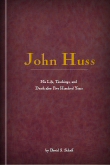
John Huss belongs not to Bohemia alone. He has a place in the religious history of Europe and the West. For Protestants, Huss appears as a forerunner of the Reformation by his assertion of the authority of the Scriptures and his definition of the church. Moreover, to all who follow with interest the progress of toleration in matters of religious opinion and general thought, he occupies the place of martyr to the sacred rights of conscience.
From whatever standpoint he may be regarded, as a heretic or as an advocate of forgotten Scriptural truth, as a contumacious rebel against constituted church authority or as an advocate of the just rights of conscience, his personality and teachings promote the study of the foundations of church authority in such an irenic spirit that the cause of the mutual recognition of Christians, one of the other, may be advanced. As Schaff asks in the introduction, “Is it too much to hope that the solemn study of this man’s Christian aims and death may promote the disposition to regard with tolerance doctrinal errors when the persons who hold them are moved with devotion to the person of Christ and the promotion of goodwill among men?”
This biography is intended not only to set forth the teachings and activity of John Huss and the circumstances of his death but also to show the perpetuation of his influence upon the centuries that have elapsed since he suffered at the stake. “He being dead yet speaketh.”
Authentic in its subject matter, and fresh and stimulating in manner of presentation. John Wycliffe is called the “Morning Star of the Reformation,” but John Huss gathered up the teachings of Wycliffe into a living faith, and became the leading exponent in life and teaching of the principle of soul liberty. Luther was familiar with the writings of Huss and recognized in them the seed corn of the Reformation, acknowledging his indebtedness to the Bohemian martyr in these words: ‘We were all Hussites without knowing it.’
—The Sabbath Recorder
In his Life of Huss professor David S. Schaff, of the Western Theological Seminary, has undertaken to give a concise presentation of the reformer’s work and thought. The story moves with dramatic directness from stage to stage up to the final crisis.
—Nation
Based upon careful and long continued research and made vivid by well chosen allusions to personal visits to the scenes of action, the narrative carries us along easily and with a sense of completeness to the tragic close.
—Harvard Theological Review
A careful and thoughtful biography.
—Boston Transcript
A thorough, historical appreciation, which needed to be done by a competent hand.
Serious readers should welcome this comprehensive and scholarly life of Huss, for it is eminently readable, just, and broadminded.
—New York Times
David S. Schaff (1852–1941), son of Philip Schaff, was professor of church history at Lane Theological Seminary from 1897 to 1903. He then taught at Western Theological Seminary. His works include Our Father’s Faith and Ours: A Comparison between Protestantism and Romanism, John Huss: His Life, Teachings, and Death after Five Hundred Years, and Progress and Personality in Church History.
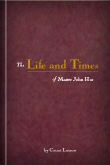
In the introduction to The Life and Times of Master John Hus, Count Lützow explains, “I write as a fervent admirer of Huss, both as an enthusiastic Bohemian patriot and as a fervent and pious Christian.” He provides a short account of Europe and Bohemia at the time of Huss and examines Huss’ forerunners: leaders who began to lay the groundwork for returning the church back to simplicity. Lützow then narrates the beginning of Huss’ opposition to the Church of Rome and follows the progression of his life and work until his death. Lützow also examines Huss’ patriotism, surveys Huss’ writings, and previews the lead-up to the The Hussite Wars.
Count Lützow (1849–1916) was an author and historian who contributed greatly to Czechoslovakia’s independence from the Austro-Hungarian Empire. His notable works on Bohemian history, literature, and politics include A History of Bohemian Literature, The Story of Prague, The Hussite Wars, and Lectures on the Historians of Bohemia.
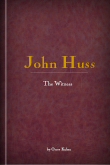
The influence of John Huss was not only exerted upon his immediate followers; Martin Luther himself tells how great that influence was on the Reformation that he himself set in motion. “In my opinion John Huss bought with his own blood the gospel which we now possess.” A precursor to the Reformation of the sixteenth century, Huss is perhaps best represented in an early Moravian hymnbook picture showing Wycliffe seizing a torch, Huss lighting it, and Luther holding it on high. Huss’ heroic death is the heritage of all mankind, and Kuhns’ account of this extraordinary life is depicted in these nine chapters:
- Forerunners of the Reformation
- Political, Social, and Religious Conditions in Bohemia
- Early Life and Activity of Huss
- Huss and the Roman Hierarchy
- Huss in Exile
- Huss Goes to Constance
- Imprisonment, Trial, and Death of Huss
- The Wars of the Hussites
- Conclusion
This truly valuable book is well written, easily read, and has a charm of expression that prevents the ‘tire of dry history.’
—American Church Convention
Oscar Kuhns gives a well written account of the career of Huss, including also the history of the times of which he was in large part the leading spirit.
—Religious Telescope
Oscar Kuhns (1856–1929) was a professor at Wesleyan University and the author of numerous works, including The Germans and Swiss Settlements of Colonial Pennsylvania, The Great Poets of Italy, Dante and the English poets from Chaucer to Tennyson, and Saint Francis of Assisi.
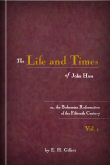
Beginning with the history of Bohemia at the close of the fourteenth century, E. H. Gillett briefly documents the general religious atmosphere and the lives of Huss’ predecessors. From there, Gillett shows that on the great chessboard of European history, monarchs might be merely pawns, like Wenzel of Bohemia, or Charles VI of France. The real kings were the men of thought—pamphleteers, like Ullerston, Gerson, and Clemenges, or reformers, like Wycliffe, Janow, Jacobel, and Huss.
It is true that the great reform movement, of which Huss was the leader, was, after a most desperate and prolonged struggle, crushed out—not, however, without leaving behind its important results. Huss and fellow reformers, such as Jerome of Prague, were burned at the stake for their ideas, but their ideas had taken root in the nation’s heart. The attention of Europe—of emperors, kings, popes, and councils—was riveted, for almost an entire generation, upon the progress and prospects of the movement originated by Huss at Prague.
E. H. Gillett’s exceptional Life and Times of John Huss documents this epoch of Reformation history, culling together a mass of historical documents into a single, important narrative. Volume one spans from 1347 to 1415.
The narrative is lucid and animated. It is adapted not to theologians or historical scholars only, but to any intelligent reader.
—Yale Review
The author has achieved a great work, performed a valuable service for Protestantism and the world, made a name for himself among religious historians, and produced a book that will hold a prominent place in the esteem of every religious scholar.
—New York Observer
One of the most valuable contributions to ecclesiastical history yet made in this country.
—New York Evangelist
The new method of writing history finds a fresh illustration, and yields us some most valuable results, in these volumes of Dr. Gillett, devoted to the most significant periods of Bohemian history, and to the development of that intense struggle in the ecclesiasticism of Europe which heralded the conclusion of the next hundred years. The author has studied his subject with great care, conscientiousness, and patience, only spurred on by the scantiness of his ready materials, resolved to master his task, and lift Huss and his coadjutors into their proper places of honor.
—Freewill Baptist Quarterly
E. H. Gillett (1823–1875) graduated from Yale in 1841 and from Union Theological Seminary in 1844. In 1868, he was appointed as a professor of political economy, ethics, and history at New York University. His works include Theory of the Moral System, History of the Presbyterian Church in the United States of America, and Life Lessons in the School of Christianity.
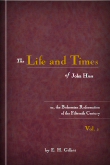
Beginning with the history of Bohemia at the close of the fourteenth century, E. H. Gillett briefly documents the general religious atmosphere and the lives of Huss’ predecessors. From there, Gillett shows that on the great chessboard of European history, monarchs might be merely pawns, like Wenzel of Bohemia, or Charles VI of France. The real kings were the men of thought—pamphleteers, like Ullerston, Gerson, and Clemenges, or reformers, like Wycliffe, Janow, Jacobel, and Huss.
It is true that the great reform movement, of which Huss was the leader, was, after a most desperate and prolonged struggle, crushed out—not, however, without leaving behind its important results. Huss and fellow reformers, such as Jerome of Prague, were burned at the stake for their ideas, but their ideas had taken root in the nation’s heart. The attention of Europe—of emperors, kings, popes, and councils—was riveted, for almost an entire generation, upon the progress and prospects of the movement originated by Huss at Prague.
E. H. Gillett’s exceptional Life and Times of John Huss documents this epoch of Reformation history, culling together a mass of historical documents into a single, important narrative. Volume two spans from 1415 to 1650.
E. H. Gillett (1823–1875) graduated from Yale in 1841 and from Union Theological Seminary in 1844. In 1868, he was appointed as a professor of political economy, ethics, and history at New York University. His works include Theory of the Moral System, History of the Presbyterian Church in the United States of America, and Life Lessons in the School of Christianity.
John Huss (also known as Jan Hus or John Hus) (1369–1415) was born in Husinec, a town in the South Bohemian region of the Czech Republic. He graduated from the University of Prague with a master’s degree in 1396, and in 1400 he was ordained as a priest. During his university studies, Huss read John Wycliffe’s works, which had a significant impact on his theological beliefs. From the pulpit, Huss began preaching Wycliffe’s ideas and calling for reforms to the Church. In 1413, he penned De Ecclesia, or The Church, which reiterated some of Wycliffe’s ideas and advanced Huss’ own calls for reform. In 1414, Huss was invited to the Council of Constance to advocate his position of church reform. He was under the impression that he was officially protected. After a few weeks, he was imprisoned and put on trial for heresy. After refusing to recant his positions, he was burned at the stake on July 6, 1415.
Reviews
8 ratings

Unix
1/12/2016
AeliusCicero
6/19/2014

Johnnie Ray Bailey
1/4/2014

Larry Proffitt (I
11/13/2013
Bobby Terhune
10/13/2013

Caleb Allen
10/12/2013

Doug
7/27/2013

Faithlife User
7/12/2013